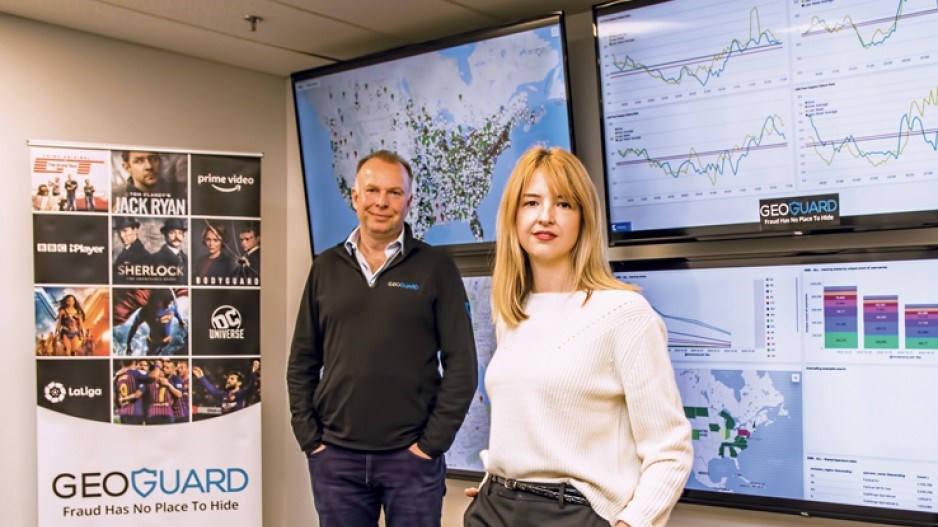Anna Sainsbury is the first to admit the tools her company was building when she founded GeoComply Solutions Inc. a decade ago were for a niche market.
The Vancouver-based cybersecurity firm specializes in detecting whether online users of streaming services or online gambling websites are trying to mask their locations using means such as virtual private networks (VPN).
But in 2011, VPNs weren’t yet being tapped by throngs of sports betters or else TV viewers trying to evade Netflix Inc.’s (Nasdaq:NFLX) geolocation filters to watch Scandinavian crime procedurals in abundance.
“We're just so fortunate that both the initial niche market grew, but also the use cases across other large sectors grew as well,” said Sainsbury, the company’s chairwoman and a BIV Forty Under 40 winner.
The proliferation of VPNs — and GeoComply’s role in protecting rights holders from those services — is now catching the eye of institutional investors.
The company revealed Tuesday it’s inked an agreement with Blackstone Growth and Atairos Management LP for minority investments in GeoComply.
Terms of the deal were not disclosed but Sainsbury told BIV “it’s safe to say that Vancouver definitely has birthed another unicorn.”
Unicorns typically refer to tech companies valued at US$1 billion or more. Sainsbury confirmed to BIV that is her definition of unicorn as well.
“I’m taking the day to let it settle in,” she said.
“I mean it's an amazing accomplishment and it's so easy to just move on to the next task because we have a tremendous, tremendous amount of work ahead of us really to deliver on our goals and our objectives.”
Product development, investments in the workforce and potential acquisition targets are all in the cards with the new partnership, according to Sainsbury.
“So many industries are moving online, and the vulnerabilities of e-commerce and online banking are becoming more apparent,” she said.
Software developed by GeoComply and subsidiary GeoGuard is installed on about 350 million devices worldwide. If a user wants to use a streaming sports app, for example, he or she will need to ensure the software is on the device so the company can verify the user is in a permitted jurisdiction.
Meanwhile, sightings of unicorns are relatively rare in B.C.
Last month New York-based Diligent Corp. acquired Galvanize (ACL Services Ltd.) and although terms of that deal were not disclosed, Galvanize CEO Laurie Schultz told BIV her company went for US$1 billion.
Before that, American tech giant Motorola Solutions Inc. (NYSE:MSI) acquired Avigilon Corp. for US$1 billion back in 2018.
Beyond those two, examples of billion-dollar valuations are sparse for Vancouver companies.
But GeoComply’s ascendancy to unicorn status hasn’t always been in a direct path.
Founded in Las Vegas, the company relocated to Sainsbury’s hometown of Vancouver in the 2010s after determining there was better access to talent in B.C. than Nevada.
But it wasn’t until 2018, when the U.S. Supreme Court struck down the Professional and Amateur Sports Protection Act (PAPSA), that Sainsbury knew with certainty GeoComply’s technology was about to explode.
The PAPSA ruling gave way to American states legalizing betting on sports — and with it, the need for those states to ensure bets are being placed in proper jurisdictions.
CEO David Briggs told BIV in November GeoComply has “grown like crazy” the past few years, but the pandemic, coupled with five U.S. states launching online sports betting in 2020, has accelerated demand for its technology. So much so that GeoComply doubled its headcount to 200 workers last year.
“In many cases, the consumers themselves feel like it’s a victimless crime,” he said, referring to viewers who mask their identity to access content not legally available where they live.
“But the reality is for the rights holders, whether you’re making movies or TV shows or putting a sports team together, the ability to price depending on a market makes about 50% of your bottom line.”




